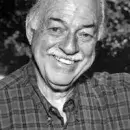
Professor
Robert McCormick Adams
(
–
)
1926
2018
University of Chicago
;
Chicago, IL
Anthropologist; Educator; Museum administrator
Area
Social and Behavioral Sciences
Specialty
Anthropology and Archaeology
Elected
1967
Robert McCormick Adams is Adjunct Professor of Anthropology at the University of California, San Diego. From 1984 to 1994 he served as the ninth Secretary of the Smithsonian Institution in Washington, D.C. He was Director of the Oriental Institute at the University of Chicago in 1962-68 and 1981-83, and served as the Provost of the University of Chicago from 1982-1984. Elected 1967 (III:5). Member, National Academy of Sciences. One of America's foremost archaeologists, Adams has worked in both the Near East and Mesoamerica. In scholarly circles, he is best known for his pioneering research in Iraq. As Secretary of the Smithsonian, Adams sought to prepare the Institution for the 21st century, focus on scholarship, increase public programs, and emphasize a broader representation and involvement of diverse ethnic and cultural communities in the Smithsonian and its programs. Adams oversaw construction of the Quadrangle, a building project that brought together two museums and many disparate offices into a single structure, but he also sounded the alarm to the US Congress about the state of the Institution's aging infrastructure and began the systematic renovation of existing facilities. During Adams' tenure, the Smithsonian acquired the National Museum of the American Indian, and the National Postal Museum was established to showcase the National Philatelic Collection. The National Science Resources Center was created to improve the teaching of pre-college science and mathematics, and the International Center was established to explore ancient and evolving cultures and to serve as the Smithsonian's headquarters for Latin American scholarship, exhibitions, and programs. As a scholar, he has studied the development of urban civilizations over many millennia, and he has also dealt with the history of technology. Partly as an outgrowth of decades of experience in Iraq, Iran and Saudi Arabia, he has been involved in studies of multiethnic violence under the joint sponsorship of the US National Academy of Sciences and the Russian Academy of Sciences. Over the course of his career Adams has emphasized the importance of social interaction and cultural ecology in the evolution of civilizations. His research has explored how cultural ecology can help explain the rise of civilizations and how cultures affect each other. Adams has received numerous awards and honors, including honorary degrees from the University of Illinois, Copenhagen University, Harvard University, Brandeis University, the College of William and Mary, Dartmouth College, and others. He has served as a trustee of Morehouse College, American University of Beirut, the Santa Fe Institute, the Russell Sage Foundation, and the National Opinion Research Center.
Last Updated